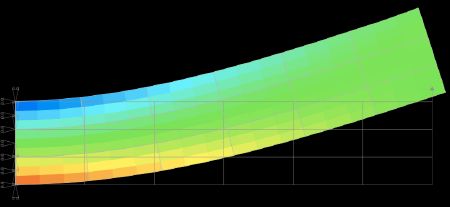Difference between revisions of "Sample FEA Input Command File"
| (7 intermediate revisions by the same user not shown) | |||
| Line 66: | Line 66: | ||
==== Trial Run with Scripted FEA Input ==== | ==== Trial Run with Scripted FEA Input ==== | ||
These scripted commands can be tried out by copying all the commands and pasting them into an empty window in [[NairnFEAMPM]] or in [[NairnFEAMPMViz]]. When done, choose the "Analyze → Run FEA/MPM Analysis" menu command. The results will stream to a window. When they are done, you can visualize the results. | These scripted commands can be tried out by copying all the commands and pasting them into an empty window in [[NairnFEAMPM]] or in [[NairnFEAMPMViz]]. When done, choose the "Analyze → Run FEA/MPM Analysis" menu command. The results will stream to a window. When they are done, you can visualize the results. These sample calculations are for an end-loaded cantilever beam. The image below shows plot of stress in the <tt>x</tt>-direction for this sample problem. | ||
[[File:Beam.jpg|center]] | |||
== XML FEA Input Command File == | == XML FEA Input Command File == | ||
| Line 136: | Line 138: | ||
==== Trial Run with XML FEA Input ==== | ==== Trial Run with XML FEA Input ==== | ||
These <XML> commands can be tried in [[NairnFEAMPM]] or [[NairnFEAMPMViz]] as described [[#Trial Run with Scripted FEA Input|above]]. Alternatively, they can be used to try out [[Options for Running Calculations | These <tt>XML</tt> commands can be tried in [[NairnFEAMPM]] or [[NairnFEAMPMViz]] as described [[#Trial Run with Scripted FEA Input|above]]. Alternatively, they can be used to try out [[Options for Running Calculations#Command-Line Execution|command line execution]]. To do a command-line trial run, first compile [[NairnFEA]] using the [[Compiling in Linux|command-line method]], which will install the executable in the <tt>NairnFEA/input</tt> folder. Next, run the following commands: | ||
cd nairn-mpm-fea/NairnFEA/input | |||
./NairnFEA XML_Input/Cantilever.fmcmd > Cantilever.fea | |||
The first command <tt>cd</tt>'s to the <tt>nairn-mpm-fea</tt> project folder with the executable and a folder with an example <tt>XML</tt> input file <tt>Cantilever.fmcmd</tt>. The second command runs the FEA calculations. This sample calculation is for an end-loaded cantilever beam and it will finish quickly. The outfile file <tt>Cantilever.fea</tt> will have the plain text output results. To verify the results, open the new <tt>Cantilever.fea</tt> in your visualization tools (''e.g.'', [[NairnFEAMPM]] or [[NairnFEAMPMViz]]). A sample plot of beam stresses is given [[#Trial Run with Scripted FEA Input|above]]. | |||
Latest revision as of 21:25, 14 January 2014
The two sample FEA input command files given below will run an analysis of an end-loaded cantilever beam.
Scripted FEA Input Command File
! ********** Preamble Section **********
Title "FEA Analysis of Cantilever Beam"
Name "A nairn-mpm-fea Project Member"
! Header
Header
A cantilever beam that is clamped at its base and
loaded on its free end with a single point load.
EndHeader
Analysis "Plane Stress FEA"
Element "8 Node Quadrilateral"
! ********** Parameters Section **********
! Define variables for more general mesh generation capabilities
#length=50 ! Length in mm
#depth=10 ! Depth in mm
#thick=10 ! Thickness in mm
#horiz=6 ! Elements in horizontal direction
#vert=3 ! Elements in vertical direction
#load=500 ! End load in N
#matname$="polymer" ! which material to use
! ********** Materials Section **********
Material "polymer","Polymer","Isotropic"
E 2300
nu .33
a 60
Done
! ********** Meshing Section **********
Area #matname$,#thick
Path "Bottom",#horiz
Keypoint "BotLeft",0,0
Keypoint "BotRight",#length,0
EndPath
Path "Right",#vert
Keypoint "BotRight"
Keypoint "TopRight",#length,#depth
EndPath
Path "Top",#horiz
Keypoint "TopRight"
Keypoint "TopLeft",0,#depth
EndPath
Path "Left",#vert
Keypoint "TopLeft"
Keypoint "BotLeft"
EndPath
EndArea
Resequence "BotRight"
! ********** Boundary Condition Section **********
FixLine 0,0,0,#depth
Displacement x
Displacement y
EndFixLine
FixPoint "TopRight"
Load y,#load
EndFixPoint
Trial Run with Scripted FEA Input
These scripted commands can be tried out by copying all the commands and pasting them into an empty window in NairnFEAMPM or in NairnFEAMPMViz. When done, choose the "Analyze → Run FEA/MPM Analysis" menu command. The results will stream to a window. When they are done, you can visualize the results. These sample calculations are for an end-loaded cantilever beam. The image below shows plot of stress in the x-direction for this sample problem.
XML FEA Input Command File
<?xml version='1.0'?>
<!DOCTYPE JANFEAInput SYSTEM '/Users/jnairn/Programming/Cocoa_Projects/nairn-mpm-fea/NairnFEA/input/NairnFEA.dtd'>
<JANFEAInput version="3">
<Header>
<Description>
A cantilever beam that is clamped at its base and
loaded on its free end with a single point load.
</Description>
<Analysis>1</Analysis>
</Header>
<Mesh>
<Keypoints>
<pt x="0.000000" y="0.000000" id="BotLeft"/>
<pt x="50.000000" y="0.000000" id="BotRight"/>
<pt x="50.000000" y="10.000000" id="TopRight"/>
<pt x="0.000000" y="10.000000" id="TopLeft"/>
</Keypoints>
<Path id="Bottom" intervals="6">
<keypt id="BotLeft"/>
<keypt id="BotRight"/>
</Path>
<Path id="Right" intervals="3">
<keypt id="BotRight"/>
<keypt id="TopRight"/>
</Path>
<Path id="Top" intervals="6">
<keypt id="TopRight"/>
<keypt id="TopLeft"/>
</Path>
<Path id="Left" intervals="3">
<keypt id="TopLeft"/>
<keypt id="BotLeft"/>
</Path>
<Area mat="1" thick="10.000000" type="3" flip="0">
<path id="Bottom"/>
<path id="Right"/>
<path id="Top"/>
<path id="Left"/>
</Area>
</Mesh>
<Material Type="1" Name="Polymer">
<E>2300</E>
<nu>0.33</nu>
<alpha>60</alpha>
</Material>
<GridBCs>
<BCLine x1="0" y1="0" x2="0" y2="10">
<DisBC dof="1" disp="0"/>
<DisBC dof="2" disp="0"/>
</BCLine>
<BCPt keypt="TopRight">
<LoadBC dof="2" load="500"/>
</BCPt>
<Resequence keypt="BotRight"/>
</GridBCs>
</JANFEAInput>
Trial Run with XML FEA Input
These XML commands can be tried in NairnFEAMPM or NairnFEAMPMViz as described above. Alternatively, they can be used to try out command line execution. To do a command-line trial run, first compile NairnFEA using the command-line method, which will install the executable in the NairnFEA/input folder. Next, run the following commands:
cd nairn-mpm-fea/NairnFEA/input ./NairnFEA XML_Input/Cantilever.fmcmd > Cantilever.fea
The first command cd's to the nairn-mpm-fea project folder with the executable and a folder with an example XML input file Cantilever.fmcmd. The second command runs the FEA calculations. This sample calculation is for an end-loaded cantilever beam and it will finish quickly. The outfile file Cantilever.fea will have the plain text output results. To verify the results, open the new Cantilever.fea in your visualization tools (e.g., NairnFEAMPM or NairnFEAMPMViz). A sample plot of beam stresses is given above.
